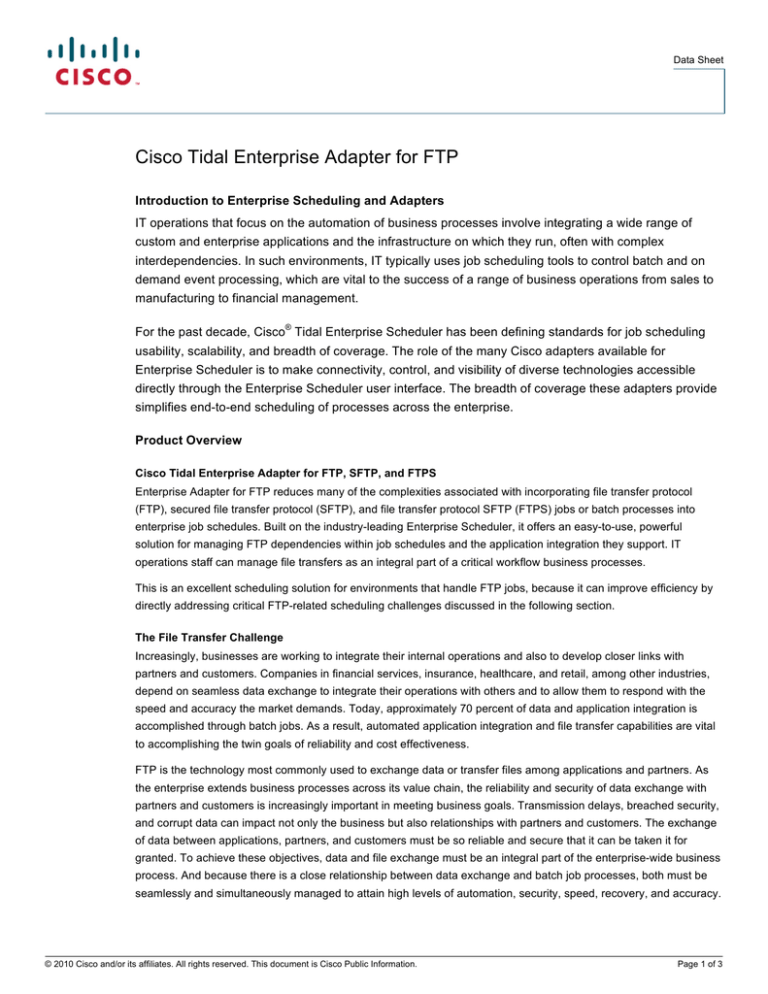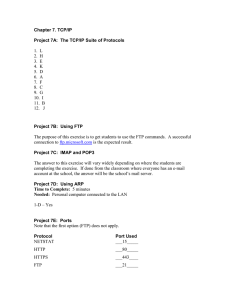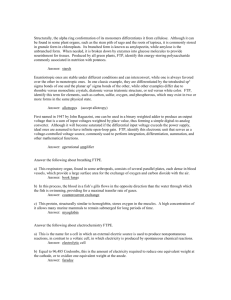
Data Sheet
Cisco Tidal Enterprise Adapter for FTP
Introduction to Enterprise Scheduling and Adapters
IT operations that focus on the automation of business processes involve integrating a wide range of
custom and enterprise applications and the infrastructure on which they run, often with complex
interdependencies. In such environments, IT typically uses job scheduling tools to control batch and on
demand event processing, which are vital to the success of a range of business operations from sales to
manufacturing to financial management.
®
For the past decade, Cisco Tidal Enterprise Scheduler has been defining standards for job scheduling
usability, scalability, and breadth of coverage. The role of the many Cisco adapters available for
Enterprise Scheduler is to make connectivity, control, and visibility of diverse technologies accessible
directly through the Enterprise Scheduler user interface. The breadth of coverage these adapters provide
simplifies end-to-end scheduling of processes across the enterprise.
Product Overview
Cisco Tidal Enterprise Adapter for FTP, SFTP, and FTPS
Enterprise Adapter for FTP reduces many of the complexities associated with incorporating file transfer protocol
(FTP), secured file transfer protocol (SFTP), and file transfer protocol SFTP (FTPS) jobs or batch processes into
enterprise job schedules. Built on the industry-leading Enterprise Scheduler, it offers an easy-to-use, powerful
solution for managing FTP dependencies within job schedules and the application integration they support. IT
operations staff can manage file transfers as an integral part of a critical workflow business processes.
This is an excellent scheduling solution for environments that handle FTP jobs, because it can improve efficiency by
directly addressing critical FTP-related scheduling challenges discussed in the following section.
The File Transfer Challenge
Increasingly, businesses are working to integrate their internal operations and also to develop closer links with
partners and customers. Companies in financial services, insurance, healthcare, and retail, among other industries,
depend on seamless data exchange to integrate their operations with others and to allow them to respond with the
speed and accuracy the market demands. Today, approximately 70 percent of data and application integration is
accomplished through batch jobs. As a result, automated application integration and file transfer capabilities are vital
to accomplishing the twin goals of reliability and cost effectiveness.
FTP is the technology most commonly used to exchange data or transfer files among applications and partners. As
the enterprise extends business processes across its value chain, the reliability and security of data exchange with
partners and customers is increasingly important in meeting business goals. Transmission delays, breached security,
and corrupt data can impact not only the business but also relationships with partners and customers. The exchange
of data between applications, partners, and customers must be so reliable and secure that it can be taken it for
granted. To achieve these objectives, data and file exchange must be an integral part of the enterprise-wide business
process. And because there is a close relationship between data exchange and batch job processes, both must be
seamlessly and simultaneously managed to attain high levels of automation, security, speed, recovery, and accuracy.
© 2010 Cisco and/or its affiliates. All rights reserved. This document is Cisco Public Information.
Page 1 of 3
Data Sheet
Manual FTP Management: Error-prone and Insecure
In many companies, processing file transfers is still a manual process. For example, a company may have a workflow
in which a customer sends a file containing all orders for the day via FTP. During the day, IT operations staff
manually checks to see if the file has arrived. If it has, they submit a series of jobs that process the order, or they may
use scripts they have written to manage this process.
This manual business process creates the following issues, and failure to meet service level agreements (SLAs) with
customers and partners may incur costly financial penalties and erode end-user satisfaction:
●
FTP is not secure and transfers data without encryption. User names, passwords, FTP commands, and the
files themselves can be viewed using packet sniffers.
●
The process of recognizing that the file has arrived and then incorporating it into a job step is inherently error
prone and time consuming.
●
Scripts are costly to create, document, and maintain.
●
If scripts are used, user IDs and passwords may be embedded in them, creating additional exposure to
security risks.
●
If the process of managing FTP is related to financial reporting, additional issues are involved in auditing it.
One operator may be required to implement the manual procedure and another to verify that it was followed.
●
The need for a job scheduler and an FTP product adds unnecessary cost and complexity.
●
FTP may require that an additional agent is installed on both the sending and receiving ends, increasing
system complexity.
●
No single point of control manages both FTP requirements and the job scheduling process.
Features and Benefits
Using Enterprise Adapter for FTP in combination with Enterprise Scheduler can dramatically simplify the process of
scheduling, tracking, and managing workflows with FTP dependencies, because the solution:
●
Incorporates FTP processes into the larger enterprise-wide workflow management environment
●
Supports both FTP and SFTP using SSH2 and FTPS using SSL/TLS
●
Avoids sending data “in the clear” by supporting Advanced Encryption Standard (AES), Data Encryption
Standard (DES), Triple DES (3DES), and Blowfish encryption techniques
●
Provides “script-free,” scheduled FTP processing to avoid further security exposure created by embedded
user IDs and passwords when scripts are used
●
Supports FTP job dependencies based on number of files and volume of data transferred, dropped files, and
duration of transfer
●
Manages file attributes and their directories
●
Requires a single FTP server rather than an FTP agent on the sending and receiving ends
●
Provides a single point of control for managing business processes dependent on FTP and batch jobs
Enterprise Scheduler provides an integration platform for all job scheduling needs. When batch jobs finish, users can
automatically transfer files as part of a larger business process. In addition, when files arrive, they can trigger one or
more jobs to process the data transferred. Users can now eliminate the manual steps and scripting that undermine
service levels and inflate the costs of managing IT. And Enterprise Scheduler makes it easy to accomplish these
objectives by using the same interface to manage FTP jobs and dependencies that it uses for all jobs and
dependencies.
© 2010 Cisco and/or its affiliates. All rights reserved. This document is Cisco Public Information.
Page 2 of 3
Data Sheet
Key Requirements
Although specific planning and sizing is straightforward, actual requirements can vary by enterprise, depending on
the environment and type of coverage needed. Specific requirements information is easily obtainable after an initial
conversation with a product expert. Enterprise Scheduler and its adapters can be installed and deployed by users or
by engaging Cisco Services. There is also an array of online materials available through Cisco Knowledge Services.
About Cisco Tidal Enterprise Scheduler
Cisco Tidal Enterprise Scheduler drives efficiency by centralizing and providing a single view of cross-enterprise job
scheduling events. This powerful, yet easy-to-use solution enables organizations to assemble complex batch job and
business process schedules that span the enterprise. With its ability to closely monitor scheduled jobs, automatically
detect problems, and define actions to aid in recovery, business process performance can be greatly enhanced.
With the broad coverage provided by Enterprise Scheduler, IT operations teams can effectively schedule processes
that touch a wide range of databases, systems, and applications. They can also easily incorporate and manage new
applications as they come online, which helps improve the operation of mission-critical business processes as the
enterprise expands and evolves.
Companies in a variety of industries rely on Enterprise Scheduler to keep their daily operations running smoothly.
Cisco’s enterprise job scheduling software combined with Cisco’s performance management solutions can deliver
even greater levels of automation and optimization to the data center than conventional scheduling and performance
management solutions.
For More Information
For more information about this or any other Cisco product or service please visit www.cisco.com.
Printed in USA
© 2010 Cisco and/or its affiliates. All rights reserved. This document is Cisco Public Information.
1036-F
07/10
Page 3 of 3


